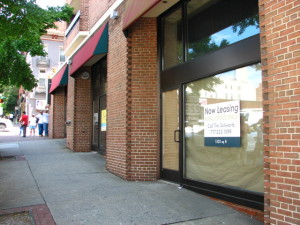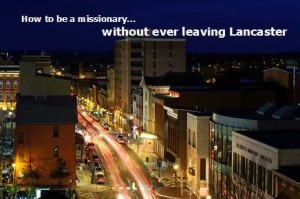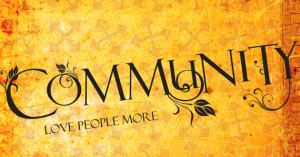 Below you'll find the text of our message along with our discussion questions from yesterday. We began the third part of our series entitled "How to be a Missionary without ever leaving Lancaster." So I would be interested in hearing your thoughts, comments, insights, questions, etc...
Below you'll find the text of our message along with our discussion questions from yesterday. We began the third part of our series entitled "How to be a Missionary without ever leaving Lancaster." So I would be interested in hearing your thoughts, comments, insights, questions, etc...
Today we enter the third part of our series entitled How to be a Missionary without ever leaving Lancaster. We begin talking about the third stage of being a missionary and in planting a missional church, that of structuring congregations. We have covered the first two stages in June and July, that of Engaging Culture, and Forming Community. And all of August we’ll be covering structuring congregations. Structuring congregations who are missionally engaged in their context, relationally engaged in building community, and discipleship-focused. We will also spend time dialoguing around major concepts and ideas of how a faith community should be structured because of their engagement with their local context, and because of their communal nature.
Today we are going to look at, what I believe, is a pivotal text, in this discussion about structuring a community of faith. This text is Colossians 1:15-20. We’ll be talking about the importance of Jesus in the life of the faith community, the role of Jesus (which all seems like a no-brainer…but sometimes, and this might be my baggage from being in youth ministry so long…that it seems like the church is no different than any other social club or group) in the faith community, and how we move beyond image to substance within our community.
So let’s look at Colossians 1:15-20, what it said to the early Christians in Colossae in the midst of the empire, and what it might say to us gathered together today in the midst of our own empire(s). Colossians 1:15-20 says, “The Son is the image of the invisible God, the firstborn over all creation. For in him all things were created: things in heaven and on earth, visible and invisible, whether thrones or powers or rulers or authorities; all things have been created through him and for him. He is before all things, and in him all things hold together. And he is the head of the body, the church; he is the beginning and the firstborn from among the dead, so that in everything he might have the supremacy. For God was pleased to have all his fullness dwell in him, and through him to reconcile to himself all things, whether things on earth or things in heaven, by making peace through his blood, shed on the cross.”
So the first thing you need to know is that most scholars believe that this text came from a poem or hymn in the early church that described what Christians believed about Jesus. Also if we look at the entire context of the letter to the church at Colossae we see that it is about shaping the imagination of the Christian community within the shadow of the empire. Within these lines of poetry, is one of the most subversive texts in all of the New Testament. Paul uses words that are a direct affront to Caesar and his claim to Lordship and Headship. You see in a worship populated by images of Caesar, who is taken to the be the son of God, a world in which the emperor’s preeminence over all things, bolstered by political structures, and is an empire that views Rome as the head of the world, and imposes compliance through force (mainly the threat of crucifixion), this poem, this text is nothing less than treasonous. You see in this 3 stanza poem, Paul subverts every major claim of the empire, turning them on their heads and proclaiming Christ (not Caesar) to be Creator, Redeemer, Savior and Lord of all creation, including the empire itself.
Paul starts off by saying that Jesus is the image of the invisible God. Now in a world in which images of the emperor we ubiquitous in the 1st Century as Corporate logos are in the 21st, Paul was again saying that Jesus, not Caesar is God. The word image that Paul uses is the Greek word Eikon, from which we get the word Icon. It expresses 2 ideas. Likeness, as in the image on a coin or the reflection in a mirror. And manifestation, in the sense that God is fully revealed in Jesus. Paul doesn’t mean that Jesus was merely similar to the father. If so he would have used another word, the Greek word homoioma, which speaks of merely of similar appearance. The stronger word here proves that Paul knew Jesus was God, just as God the Father is God. It means that Jesus is the very stamp of God the Father. That in Christ, the unknowable God has become known. If you want to know what God looks like, look at Jesus. He is the image. He is the flesh of God in the world. He is the reflection of God.
Then Paul calls Jesus, the firstborn over all Creation. This doesn’t mean that he is a created being. Jesus is the author over all Creation. Paul is using another word that to the Jewish listener, would point to the Messiahship of Jesus, and not to Caesar. Ancient Rabbis used firstborn as a messianic title. “God said as I made Jacob a first born, so also I will make King Messiah a first born”
Paul then continues in his referencing of the creation account in Genesis 1. “For in him all things were created: things in heaven and on earth, visible and invisible, whether thrones or powers or rulers or authorities; all things have been created through him and for him. He is before all things, and in him all things hold together.” Jesus was present when the world came to be. Just look at John 1, “In the beginning was the word, and the word was with God, and the word was God.” The word meaning Jesus. Jesus was present in Genesis 1. Again, Paul’s idea that in Jesus everything was created and that he holds all things together, directly challenges the notion and the idea that Caesar was God and Caesar held everything together and created all things. Not only was Jesus the image of God, the firstborn of all Creation, he was and is in a very real way, the creator of all things.
Not only that, Paul then drops another bomb on the head of empirical Caesar worship. “And he is the head of the body, the church; he is the beginning and the firstborn from among the dead, so that in everything he might have the supremacy.” Jesus, not Caesar has supremacy. Not only in the church but in all of Creation. This concept that Jesus is the head of the church, is describing his relationship to us. Here head refers to his relationship and his role as source of the church, just as we talk about the head of a river, which is where the river starts. The church starts, continues, and ends with Jesus. Without Jesus being the head, there is no church. If something becomes the head of the church, than the church ceases to be church in the biblical sense. Whether that something is a person, an idea, a tradition, a denomination, or anything that would be put above Jesus.
Jesus is the head of the church because he is God in the flesh, because he is creator, and because he is Savior, Lord and Redeemer (again a direct affront to the claims that Caesar is Lord, Savior, Redeemer). Paul ends this part of his letter pointing to the fact that Jesus is head of the church because Jesus reconciled everything to himself through the blood shed on the cross. Jesus atoning work done on the cross is full and broad. As Paul says, “whether things on earth or things in heaven.” Jesus death on the cross isn’t just about making atonement for our sins, to set us right with him, so we can go to heaven when we die. That is a part of it, a small part. No, Jesus atoning sacrifice on the cross was about setting everything right. It was about the remaking, restoring, healing, and recreating of everything. Of setting to right all that went wrong in the Garden of Eden, and moving us back to that relationship again. When God walked in the cool of the garden with Adam and Eve. That Jesus, through his life, death, and resurrection, was doing what he did at the beginning of time, creating a new humanity, or I should say recreating a new humanity. One in which all things are set right, and that he is the head of all things, and not Caesar.
Now the questions become how do we live the gospel in our cultural context? What does it mean for us today that Jesus is the image of the invisible god? We may not have images of Caesar, but there are images of gods all around us. If the primary responsibility of Christian proclamation is to empower the community to imagine the world as if Christ, not the powers, were sovereign, what does that actually look like? How do we shape our collective imaginations as followers of Jesus in such a way that we are set free from the constructed imagination of the empire? How do we imagine a church where Jesus is head, and that Constantine is still not the emperor of our imagination? What does it mean to us that Jesus is the head of the church? How do we live into that reality in our time? We will get to that but I want to close with a poetic and updated reading of our text, which while long, I believe will help us flesh out and unpack what Paul might be saying to us today if he were to send a letter to us and how to live out the headship of Christ in our world.
In an image-saturated world
a world of ubiquitous corporate logos
permeating your consciousness
a world of dehydrated and captive imaginations
in which we are too numbed, satiated and co-opted
to be able to dream of life otherwise
a world in which the empire of global economic affluence
has achieved the monopoly of our imaginations
in this world
Christ is the image of the invisible God
in this world
driven by images with a vengeance
Christ is the image par excellence
the image above all other images
the image that is not a facade
the image that is not trying to sell you anything
the image that refuses to co-opt you
Christ is the image of the invisible God
the image of God
a flesh and blood
here and now
in time and history
with joys and sorrows
image of who we are called to be
image-bearers of this God
He is the source of a liberated imagination
a sub-version of the empire
because it all starts with him
and it all ends with him
everything
all things
whatever you can imagine
visible and invisible
mountains and atoms
outer space, urban space, and cyberspace
whether it be the Pentagon, Disneyland,
Microsoft, or AT&T
whether it be the institutionalized power structures
of the state, the academy or the market
all things have been created in him and through him
he is their source, their purpose, their goal
even in their rebellion
even in their idolatry
he is the sovereign one
their power and authority is derived at best
parasitic at worse
In the face of the empire
in the face of presumptuous claims to sovereignty
in the face of the imperial and idolatrous forces in our lives
Christ is before all things
he is sovereign in life
not the pimped dreams of the global market
not the idolatrous forces of nationalism
not the insatiable desires of a consumerist culture
In the face of a disconnected world
where home is a domain in cyberspace
where neighborhood is a chat room
where public space is a shopping mall
where information technology promises
a tuned in, reconnected world
all things hold together in Christ
the creation is a deeply personal cosmos
all cohering and interconnected in Jesus
And this sovereignty takes on cultural flesh
And this coherence of all things is socially embodied
in the church
against all odds
against most of the evidence
In a "show me" culture where words alone don't cut it
the church is
the flesh and blood
here and now
in time and history
with joys and sorrows
embodiment of this Christ
as a body politic
around a common meal
in alternative economic practices
in radical service to the most vulnerable
in refusal to the empire
in love of this creation
the church reimagines the world
in the image of the invisible God
In the face of a disappointed world of betrayal
a world in which all fixed points have proven illusory
a world in which we are anchorless and adrift
Christ is the foundation
the origin
the way
the truth
and the life
In the face of a culture of death
a world of killing fields
a world of the walking dead
Christ is at the head of the resurrection parade
transforming our tears of betrayal into tears of joy
giving us dancing shoes for the resurrection party
And this glittering joker
who has danced in the dragon's jaws of death
now dances with a dance that is full
of nothing less than the fullness of God
this is the dance of the new creation
this is the dance of life out of death
and in this dance all that was broken
all that was estranged
all that was alienated
all that was dislocated and disconnected
is reconciled
comes home
is healed
and is made whole
everything
all things
whatever you can imagine
visible and invisible
mountains and atoms
outer space, urban space, and cyberspace
every inch of creation
every dimension of our lives
all things are reconciled in him
And it all happens on a cross
it all happens at a state execution
where the governor did not commute the sentence
it all happens at the hands of the empire
that has captivated our imaginations
it all happens through blood
not through a power grab by the sovereign one
it all happens in embraced pain
for the sake of others
it all happens on a cross
arms outstretched in embrace
and this is the image of the invisible God
this is the body of Christ
Discussion Questions:
1. What thoughts, comments, insights, questions, push back, etc.. do you have regarding the text and the message?
2. What are some things that have taken the place, or possibly could take the place at the head of the church if not careful? How do we guard against other things becoming the head?
3. How can you and I live in such a way that we place Jesus at the head of the church, and also the head of our lives?
4. What is God saying to you and what are you going to do about it? What is God saying to us and what are we going to do about it?
 Have you ever had a naughty thought? Or course you have. Have you ever wished that someone could see your naughty thought? Probably not. Have you ever thought Naughty Thoughts about the church? Huh? Naughty thoughts about the church? That doesn't make sense.
Have you ever had a naughty thought? Or course you have. Have you ever wished that someone could see your naughty thought? Probably not. Have you ever thought Naughty Thoughts about the church? Huh? Naughty thoughts about the church? That doesn't make sense. 











